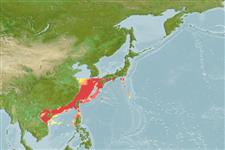分类 / Names
俗名 | 同种异名 | Catalog of Fishes(属, 种) | ITIS | CoL | WoRMS | Cloffa
Environment: milieu / climate zone / depth range / distribution range
生态学
海洋 居于水底的; 海洋洄游的 (Ref. 51243); 深度上下限 10 - 200 m (Ref. 41299). 亞熱帶的; 34°N - 15°N
Northwest Pacific: northeastern part of South China Sea (Philippines excluded) northward to Japan.
西北太平洋: 南中國海 (菲律賓排除) 的東北方部份向北至日本。
Length at first maturity / 大小 / 重量 / 年龄
Maturity: Lm 34.3 range ? - ? cm
Max length : 100.0 cm SL 雄鱼/尚未辨别雌雄; (Ref. 559); common length : 30.0 cm TL 雄鱼/尚未辨别雌雄; (Ref. 2115); 最大体重: 9.7 kg (Ref. 40637); 最大年龄: 26 年 (Ref. 56606)
背棘 (总数) : 12; 背的软条 (总数) : 10; 臀棘: 3; 臀鳍软条: 8. Body with many bluish dots when fresh. Shallow body, body depth 2 or more in SL. Transverse scales 6.5-7.5. All spines of dorsal fin tough and not elongated. Posterior margin of caudal fin black, lower margin white (Ref. 42199).
身体有新鲜时的许多蓝色的点。 浅的身体, 体高 2 或更多分之一标准体长。 横跨的鳞片 6.5-7.5. 背鳍的所有棘强硬的而不是延长了。 尾鳍后缘黑色, 下缘白色.(参考文献 42199)
Occurs from 10 to 50 m depths, often on rough grounds, but also on softer bottoms. Also inhabits reefs (Ref. 9988). Adults migrate into shallower parts of their depth range to spawn in late spring and summer; juveniles occur mainly in the shallower areas. It is a popular food fish throughout its range. It is high-priced in Japan and used in various occasions such as wedding and festival. Feeds on benthic invertebrates, including echinoderms, worms, mollusks and crustaceans; also on fishes. Marketed live, fresh and frozen; eaten steamed, pan-fried, broiled, boiled and baked (Ref. 9988). Cultivated in cages (Ref. 9988). Used in Chinese medicine (Ref. 12166).
生存于 10 到 50 公尺深, 时常在粗燥的底部上, 也在软质底部上。 也居住于礁。 (参考文献 9988) 成鱼回游进入他们的深度范围的较浅的部分之内产卵于春末与夏天中; 稚鱼出现主要在较浅的区域。 在它的分布范围各处它是一个受欢迎的食用鱼。 它是评价很高在日本而且被用于各种不同的场合例如婚礼与节日。 吃底栖的无脊椎动物,包括棘皮动物,蠕虫,软件动物与甲壳动物; 也吃鱼。 活鱼销售了, 生鲜和冷冻; 清蒸, 油锅炸的,火烤的,和煮沸而烧烤的.(参考文献 9988) 用蒸笼蒸。 (参考文献 9988) 被用于中药材了。 (参考文献 12166)
Conflicting descriptions of the reproductive style of this species have been reported, e.g., Ref. 34228 describe this species as being a gonochorist (Ref. 28504). After clarificatory analyses on the protogynous characteristics of this species, gonochorism is confirmed (Ref. 103751).西北太平洋: 南中國海 (菲律賓排除) 的東北方部份向北至日本。
Eggleston, D., 1974. Sparidae. In W. Fischer and P.J.P. Whitehead (eds.) FAO species identification sheets for fishery purposes. Eastern Indian Ocean (Fishing Area 57) and Western Central Pacific (Fishing Area 71), Volume 4. FAO, Rome. (Ref. 2115)
人类利用
渔业: 高经济性; 养殖: 商业性; 游钓鱼种: 是的; 水族馆: 公众的水族馆
工具
特别资料
下载 XML
网络资源
Estimates based on models
Preferred temperature (Ref.
123201): 17 - 24.4, mean 21.8 °C (based on 143 cells).
Phylogenetic diversity index (Ref.
82804): PD
50 = 0.5156 [Uniqueness, from 0.5 = low to 2.0 = high].
Bayesian length-weight: a=0.01288 (0.01142 - 0.01453), b=3.03 (3.00 - 3.06), in cm total length, based on LWR estimates for this species (Ref.
93245).
营养阶层 (Ref.
69278): 4.5 ±0.7 se; based on diet studies.
回复力 (Ref.
120179): 低的, 最小族群倍增时间4.5 - 14 年 (Preliminary K or Fecundity.).
Prior r = 0.22, 95% CL = 0.15 - 0.33, Based on 1 full stock assessment.
Fishing Vulnerability (Ref.
59153): High vulnerability (58 of 100).
Nutrients (Ref.
124155): Calcium = 48.2 [26.4, 91.9] mg/100g; Iron = 1.48 [0.51, 3.85] mg/100g; Protein = 20.6 [18.9, 22.2] %; Omega3 = 0.328 [0.152, 0.664] g/100g; Selenium = 33.6 [15.5, 66.8] μg/100g; VitaminA = 13.5 [4.1, 42.2] μg/100g; Zinc = 0.433 [0.220, 0.895] mg/100g (wet weight);
